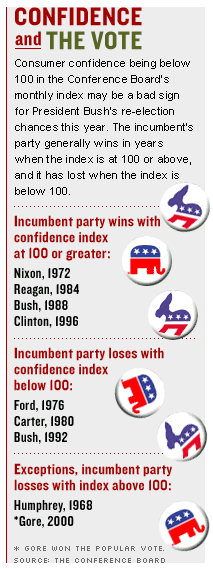NEW YORK (CNN/Money) - Consumer confidence fell for the third straight month in October to its lowest level since March, a survey said Tuesday, raising red flags for the holiday shopping season as well as President Bush's chances in next week's election.
The Conference Board said its consumer confidence index fell to 92.8 from a revised 96.7 reading in September. Economists surveyed by Briefing.com had forecast a drop to 94.0. The reading was the lowest since March, when the index stood at 88.5.
The decline is a potentially troubling sign for President Bush who's in a tight race against Sen. John Kerry. Since the 1968 election, a Conference Board index reading below 100 generally indicates a loss for the incumbent's party.
Consumer confidence is also important for the economy, since consumer spending fuels two-thirds of gross domestic product, the broadest measure of U.S. economic output.
The survey of 5,000 U.S. households by the New York-based business research group found more concern about future economic conditions than about the current state of the economy. The expectations index sank to 92.0 from 97.7, while the present situation index dipped to 94.2 from 95.3.
People are a bit more bullish on the job market. The percentage of consumers saying jobs are "plentiful" rose to 17.4 percent from 16.6 percent in September, while the percentage claiming jobs are "hard to get" was little changed -- 27.8 percent versus 28.0 percent.
But those expecting fewer jobs in the coming months rose to 18.4 percent from 16.2 percent, while those who see more jobs ahead fell to 16.5 percent from 17.8 percent.
And respondents worried about their paychecks. Those who expect their incomes to improve in the months ahead fell to 18.4 percent from 20.0 percent last month.
Nervous times for Bush
Delos Smith, senior business analyst at the Conference Board, said White House officials were probably very relieved the number didn't drop more than it did.

The big decline in the initial reading for the University of Michigan's confidence survey earlier this month raised fears that the Conference Board reading might fall into the 80's.
"They were calling us last week, trying to get a sense of what was coming," he said. "At least this isn't a horror story that would be played up as the economy collapsing."
Smith said that 90 just as easily as 100 could be the tipping point for whether an incumbent's party will win, meaning it's too soon to say if this report predicts a win or a loss for Bush.
In addition, he said other factors such as the war in Iraq could make any economic report more suspect than normal in being able to predict election results.
"This is about a C minus report (for the administration)," said Smith. "It's not good news, but it's not a clear failure."
Smith also said the report more clearly points to a sluggish holiday shopping season, with no more than 2 to 4 percent sales growth from a year earlier. That would be less than the better than 5 percent growth seen last year or the 4.5 percent gain forecast by the National Retail Federation.
Weak holiday season ahead
Other economists agreed that the report should be a red flag for retailers.
Anthony Chan, senior economist at JPMorgan Fleming Asset Management, said the October confidence number was the best indicator of holiday spending, and the reading points to a tepid gift-buying season ahead. Furthermore, it suggests weaker economic growth in 2005, he added.
"I think it's energy prices, I think it's the soft labor market and the stock market," he said. "The message we should get from this is moving forward we're facing some negative headwinds we'll have to do deal with."
Economist Robert Brusca at FAO Economics said worries about the job market and pay were particularly troubling signs for consumer spending.
"I think it's a bit early to make forecasts on holiday spending; people can find themselves caught up in the holiday spirit," he said. "But if you're really concerned about your job, it'll be tough to get anyone to lift your spirits enough to lift your credit card (spending) significantly."
Brusca and Wachovia Securities economist Gina Martin both said the close election is probably adding to consumer doubts about the future.
"An uncertain election will do that -- people don't know who the president will be, what's ahead," Martin said.
"No matter which candidate you support, you have to realize there will be a lot of discord in this country," said Brusca. "And no matter how much you like your candidate, you realize neither one of these guys has a magic bullet for the economy."
But both economists also said rising oil was also hurting consumer confidence.
"People are aware of what energy prices are doing to their pocketbooks, and their company," said Brusca.

|

